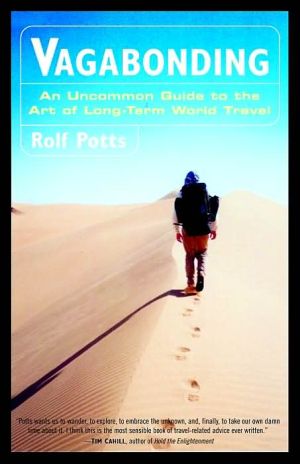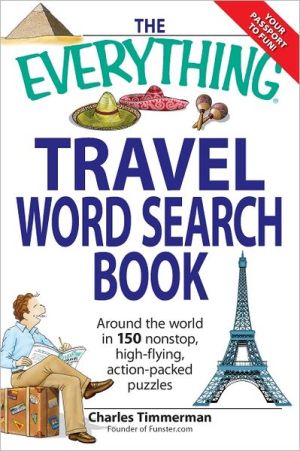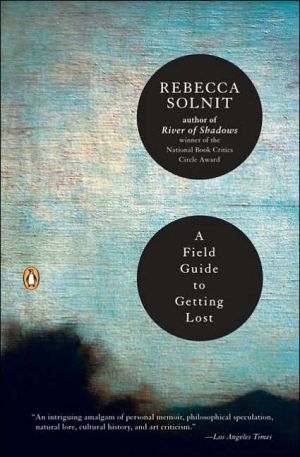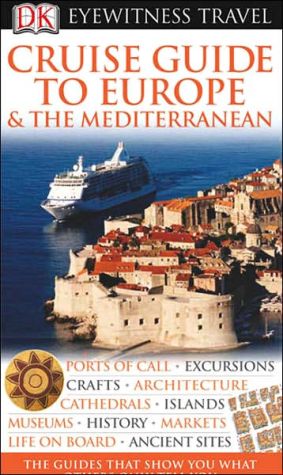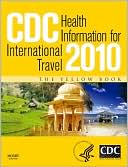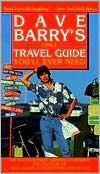Vagabonding: An Uncommon Guide to the Art of Long-Term World Travel
Vagabonding is about taking time off from your normal life—from six weeks to four months to two years—to discover and experience the world on your own terms. Veteran shoestring traveler Rolf Potts shows how anyone armed with an independent spirit can achieve the dream of extended overseas travel. Potts gives the necessary information on:\ • financing your travel time\ • determining your destination\ • adjusting to life on the road\ • working and volunteering overseas\ • handling travel...
Search in google:
Vagabonding is about taking time off from your normal life from six weeks to four months to two years to discover and experience the world on your own terms. Veteran shoestring traveler Rolf Potts shows how anyone armed with an independent spirit can achieve the dream of extended overseas travel. KLIATT Most people plan and save during the year for their two-or three-week vacation. After Disneyland, Yosemite or the Caribbean, it's back to work, home and routine. But for people like teacher and author Rolf Potts, home is temporary and work just supports their real avocation traveling or vagabonding. "Vagabonding is not merely a ritual of getting immunizations and packing suitcases. Rather, it's the ongoing practice of looking and learning... of cultivating a new fascination with people and places... it's a personal act that demands only the realignment of self." Although there are good, practical tips on traveling for extended periods, especially if alone or in countries with non-Western customs, Vagabonding is primarily a meditation on living this particular lifestyle. Like licorice or Las Vegas, vagabonding is something that one craves or dislikes, understands or finds incomprehensible. "Vagabonding is not merely reallotting a portion of your life for travel, but rediscovering the entire concept of time... you learn to improvise your days... and not obsess over your schedule." For those who are contemplating such a change, or for those who have tried it once and want to compare notes with a more experienced vagabond, this title will be an education and an encouragement. KLIATT Codes: SA Recommended for senior high school students, advanced students, and adults. 2003, Random House, Villiard, 205p., Gillen
Chapter 1 \ From this hour I ordain myself loos'd of limits and imaginary lines, Going where I list, my own master total and absolute, Listening to others, considering well what they say, Pausing, searching, receiving, contemplating, Gently, but with undeniable will divesting myself of the holds that would hold me.\ -Walt Whitman, "Song of the Open Road"\ Declare Your Independence\ Of all the outrageous throwaway lines one hears in movies, there is one that stands out for me. It doesn't come from a madcap comedy, an esoteric science-fiction flick, or a special-effects-laden action thriller. It comes from Oliver Stone's Wall Street, when the Charlie Sheen character -- a promising big shot in the stock market -- is telling his girlfriend about his dreams.\ "I think if I can make a bundle of cash before I'm thirty and get out of this racket," he says, "I'll be able to ride my motorcycle across China."\ When I first saw this scene on video a few years ago, I nearly fell out of my seat in astonishment. After all, Charlie Sheen or anyone else could work for eight months as a toilet cleaner and have enough money to ride a motorcycle across China. Even if they didn't yet have their own motorcycle, another couple months of scrubbing toilets would earn them enough to buy one when they got to China.\ The thing is, most Americans probably wouldn't find this movie scene odd. For some reason, we see long-term travel to faraway lands as a recurring dream or an exotic temptation, but not something that applies to the here and now. Instead -- out of our insane duty to fear, fashion, and monthly payments on things we don't really need -- we quarantine our travels to short, frenzied bursts. In this way, as we throw our wealth at an abstract notion called "lifestyle," travel becomes just another accessory -- a smooth-edged, encapsulated experience that we purchase the same way we buy clothing and furniture.\ Not long ago, I read that nearly a quarter of a million short-term monastery- and convent-based vacations had been booked and sold by tour agents in the year 2000. Spiritual enclaves from Greece to Tibet were turning into hot tourist draws, and travel pundits attributed this "solace boom" to the fact that "busy overachievers are seeking a simpler life."\ What nobody bothered to point out, of course, is that purchasing a package vacation to find a simpler life is kind of like using a mirror to see what you look like when you aren't looking into the mirror. All that is really sold is the romantic notion of a simpler life, and -- just as no amount of turning your head or flicking your eyes will allow you to unselfconsciously see yourself in the looking glass -- no combination of one-week or ten-day vacations will truly take you away from the life you lead at home.\ Ultimately, this shotgun wedding of time and money has a way of keeping us in a holding pattern. The more we associate experience with cash value, the more we think that money is what we need to live. And the more we associate money with life, the more we convince ourselves that we're too poor to buy our freedom. With this kind of mind-set, it's no wonder so many Americans think extended overseas travel is the exclusive realm of students, counterculture dropouts, and the idle rich.\ In reality, long-term travel has nothing to do with demographics -- age, ideology, income -- and everything to do with personal outlook. Long-term travel isn't about being a college student; it's about being a student of daily life. Long-term travel isn't an act of rebellion against society; it's an act of common sense within society. Long-term travel doesn't require a massive "bundle of cash"; it requires only that we walk through the world in a more deliberate way.\ This deliberate way of walking through the world has always been intrinsic to the time-honored, quietly available travel tradition known as "vagabonding."\ Vagabonding involves taking an extended time-out from your normal life -- six weeks, four months, two years -- to travel the world on your own terms.\ But beyond travel, vagabonding is an outlook on life. Vagabonding is about using the prosperity and possibility of the information age to increase your personal options instead of your personal possessions. Vagabonding is about looking for adventure in normal life, and normal life within adventure. Vagabonding is an attitude -- a friendly interest in people, places, and things that makes a person an explorer in the truest, most vivid sense of the word.\ Vagabonding is not a lifestyle, nor is it a trend. It's just an uncommon way of looking at life -- a value adjustment from which action naturally follows. And, as much as anything, vagabonding is about time -- our only real commodity -- and how we choose to use it.\ Sierra Club founder John Muir (an ur-vagabonder if there ever was one) used to express amazement at the well-heeled travelers who would visit Yosemite only to rush away after a few hours of sightseeing. Muir called these folks the "time-poor" -- people who were so obsessed with tending their material wealth and social standing that they couldn't spare the time to truly experience the splendor of California's Sierra wilderness. One of Muir's Yosemite visitors in the summer of 1871 was Ralph Waldo Emerson, who gushed upon seeing the sequoias, "It's a wonder that we can see these trees and not wonder more." When Emerson scurried off a couple hours later, however, Muir speculated wryly about whether the famous transcendentalist had really seen the trees in the first place.\ Nearly a century later, naturalist Edwin Way Teale used Muir's example to lament the frenetic pace of modern society. "Freedom as John Muir knew it," he wrote in his 1956 book Autumn Across America, "with its wealth of time, its unregimented days, its latitude of choice . . . such freedom seems more rare, more difficult to attain, more remote with each new generation."\ But Teale's lament for the deterioration of personal freedom was just as hollow a generalization in 1956 as it is now. As John Muir was well aware, vagabonding has never been regulated by the fickle public definition of lifestyle. Rather, it has always been a private choice within a society that is constantly urging us to do otherwise.\ This is a book about living that choice.\
\ From Barnes & NobleThe Barnes & Noble Review\ Many of us harbor the fantasy of just packing up and taking off to travel the world, but few can really imagine having the time, or the money, to do such a thing. Enter Rolf Potts, veteran globe-trotter, adventure travel writer, and vagabond. As Potts explains, extended world travel is not really about having the time or the money; it's about adopting the right outlook and giving yourself the freedom to pick up and go. This book will sway readers to adopt such an outlook, with encouragement to "loosen your grip on the so-called certainties of this world" and take "control of your circumstances instead of passively waiting for them to decide your fate." The author's alluring prose is accompanied by questionnaires to help readers develop a more specific picture of their planned journey, as well as profiles of vagabonds such as Walt Whitman, Henry David Thoreau, John Muir, and Annie Dillard. \ Of course, there are also practical matters to be addressed. Vagabonding instructs on those topics as well, providing information on funding your extended sojourn, quitting your job on good terms, finding work overseas, managing your time, meeting people, and remaining safe on your travels. Potts includes ample additional resources, with helpful books and web sites listed in each chapter.\ Vagabonding is an inspiring book that will prepare you mentally and pragmatically to embark upon the travels you've always dreamed of. And, if nothing else, it will provoke you to cultivate the "friendly interest in people, places, and things that makes a person an explorer in the truest, most vivid sense of the word." Karen Burns\ \ \ \ \ \ KLIATTMost people plan and save during the year for their two-or three-week vacation. After Disneyland, Yosemite or the Caribbean, it's back to work, home and routine. But for people like teacher and author Rolf Potts, home is temporary and work just supports their real avocation—traveling or vagabonding. "Vagabonding is not merely a ritual of getting immunizations and packing suitcases. Rather, it's the ongoing practice of looking and learning... of cultivating a new fascination with people and places... it's a personal act that demands only the realignment of self." Although there are good, practical tips on traveling for extended periods, especially if alone or in countries with non-Western customs, Vagabonding is primarily a meditation on living this particular lifestyle. Like licorice or Las Vegas, vagabonding is something that one craves or dislikes, understands or finds incomprehensible. "Vagabonding is not merely reallotting a portion of your life for travel, but rediscovering the entire concept of time... you learn to improvise your days... and not obsess over your schedule." For those who are contemplating such a change, or for those who have tried it once and want to compare notes with a more experienced vagabond, this title will be an education and an encouragement. KLIATT Codes: SA—Recommended for senior high school students, advanced students, and adults. 2003, Random House, Villiard, 205p., Gillen\ \
